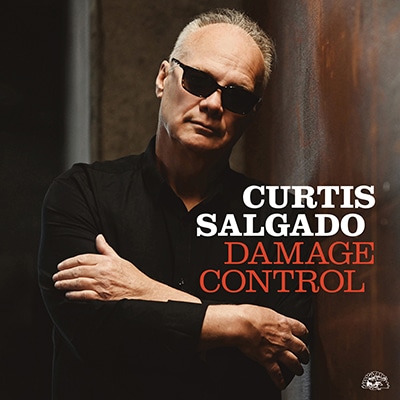
Tim Parsons / Tahoe Onstage
Curtis Salgado must be doing something right. Despite having endured three bouts with cancer, a kidney transplant and a triple-bypass, he’s blowing full-force, melodic harp, and singing soul, blues and rock ‘n’ roll in one of the most commanding voices this side of Solomon Burke.
Salgado offhandedly attributes his 67 years on earth and his half-century’s worth of perseverance in this business to “Damage Control,” and he expresses a variety of perspectives on that notion in these inspired, inspiring new songs. Salgado’s made some great albums in his day, but this, his 11th, jumps out at and sticks with a listener by virtue of its witty lyrics, sweet grooves, and deeply-sinking, funky hooks.
Amongst curlicues of gospel-styled piano and quick washes of organ, Salgado steps up and casually declares, “Let me testify a little bit, yes, yes.” And with that, he sets right off, proving his mettle in “The Longer That I Live,” conveying bright hope and gravelly determination, his robust band kicking up a charging melody along with him. When Salgado sings that the longer he lives, the older he wants to get, he makes a powerful point encouraging tenacity and thankfulness in the face of huge obstacles.
Long a pillar of Portland, Oregon’s rich music community, Salgado employs several different styles in his delivery of these songs, all clearly the result of engrained experience. The sleekness and urgency of Detroit soul permeates “What Did Me in Did Me Well,” as he sings of his foibles, support, and of making it through. West Coast blues guitarist Kid Andersen tears it up at the end of that song, right in line with Salgado’s agonized shouting. Pianist Kevin McKendree and guitarist George Marinelli take the lead in generating the roadhouse rockabilly of “I Don’t Do That No More” and “You’re Gonna Miss My Sorry Ass.” Each of those bear Salgado’s unique brand, but could also fit comfortably within Delbert McClinton’s bag of wise-ass tricks.
Cut in three distinct sessions with a large cast of choice players, horns and backing vocals included, the album nonetheless flows naturally through a variety of compelling moods. Heartland rock mixes easily with greasy Southern blues in “Precious Time,” classic doo-wop lights up “Count of Three,” and the gritty, vintage soul of Stax in Memphis surges through “Damage Control.” In a jolly left turn down to the swamps of Louisiana, Salgado sings the happy, rollicking “Truth Be Told” as a duet with singer and squeezebox king, Wayne Toups. A righteous departure from the album’s overall theme, it’s a beautiful song that celebrates true love, Cajun-style.
Although it contains serious releases of bare-naked emotion, the entirety of “Damage Control” comes off lighthearted. Absolutely anyone can relate to, come to terms with, laugh at, and dance their asses off to these tunes. Salgado embodies soul and blues music; he’s lived what he sings. And though he notes the eventuality of his “final curtain call” at the close of “The Longer I Live,” the potency throughout “Damage Control” suggests that Curtis Salgado is not going to call it a day anytime soon.
-Album review by Tom Clarke

Curtis Salgado
‘Damage Control’
Label: Alligator Records
Release: Feb 26, 2021
Live: Saturday, Oct. 15, at the Crystal Bay Casino, along with Elvin Bishop’s Big Fun Trio
Q&A: Foreshadowing Curtis Salgado writes songs germane to pandemic
“Damage Control” is fantastic. By not being able to tour due to Covid, you must have had time to reflect and to write these pandemic-themed songs, such as “The Longer That I Live,” “Precious Time,” “What Did Me In Did Me Well,” and “Always Say I Love You (At The End Of Your Goodbyes).’ Am I correct?
No, sir. That’s not true. I started writing these songs in 2017. The record was finished in February 2020, then Covid crawled upon the shores. We were playing a gig in Everett, Washington, the night they announced that it had hit an assisted-living nursing home in Everett. That’s part of the Covid story: It started in the Northwest. Two weeks later, March, 11, I was saying to myself, “They’re going to hold the record back, and sure enough, Alligator did because touring had stopped. Alan Hagar and myself were doing a string of concerts in Saipan as a duet, and I said to him, “You know, man, until we know the health status of an entire audience, we’re not going to be able to play.” I was thinking every song on my record pertains to Covid.” And Alan looks at me and goes, “You’re the Nostradamus of the blues.
It’s an album that celebrates your weaknesses, and your survival. Where do you summon the courage from in overcoming your weaknesses, and what do you attribute your incredible perseverance to do so?
You pick yourself up and you dust yourself off. I am the one of these people who lives one day at a time. You check yourself and you are still alive. “Oh For The Cry Eye,” if you listen to the lyrics, it’s for me trying to check my snap temper. People don’t see it. Me personally, I see it. You try to check yourself and try to be a better person.
About the health issues, I can’t do anything about it. I don’t drink, I don’t smoke. I was a bad boy until the age of 35. I knew I had Hepatitis C, that’s the leading cause of liver cancer. Sure enough, I got liver cancer. I got a transplant and that was a blessing and I was very lucky. Does it affect me? It makes you very focus in very hard on life and what’s important and what’s not. I’ve had 32 years of sobriety. I had six months to live. I don’t piss and moan about stuff. Just move on down the line and do the best I can. I just put my head down and went forward. When you have cancer and a liver that’s got a tumor the size of a lemon it’s, ahh, so how do you get a transplant? You have decisions to make and you have a lot of roads you can take. Everything is about percentage. … It’s all damage control.
Hence the song and album title.
Life is damage control. What we are going through is an extreme and sharp focus on that. But another day is just beginning, another day will soon end and what you call in between is what we call this life, my friend. We didn’t ask to be here. I didn’t have a choice. You didn’t ask to be on planet earth. Nobody asked my opinion because we don’t have a voice. … So you just keep your head up and stay down low, slow your breathing and deal with this damage control. That’s zen to me. I am very proud of that song and I hope other people hear that. Life is damage control.
There is one cover song: “Slow Down,” by Larry Williams and later covered by The Beatles. You really cut loose on that one. How did you come up with it?
I feel I’m cutting loose on all of them. I don’t want to copy Larry Williams, but it’s the overall vibe he’s putting out. He’s one of the greatest rock ‘n’ roll singers. He’s just a cool singer with a cool timbre. It almost sounds like he’s hoarse. I have a couple of other versions that are even wilder. We weren’t going to put it on the record. It was going to be all originals, but if came out so ferocious, we decided to put it in on the end of it. It’s kind of a bonus track. The Beatles do a good job with it, but I am a huge fan of Larry Williams. Quote me.
What I meant was that a lot of talented singers like to show off and sing a lot of notes. But with this record you stay within the song.
That’s nice of you to say. That’s the best thing I’ve heard all year. I’m trying to write songs with a melody. When do them live, if I ever get the chance again, they might alter here and there, but I think if people listen to the song they want to hear that. Even though I can do all these runs. It’s a song. It’s a song for you to sing as well, so you can follow along and it’s got a melody.
This video of you dancing to “The Longer That I Live “ is great. Are you doing a little Charlie Chaplin in there?
The guy who did the film is a very creative young man named Joshua James Huff. What I had in my mind was that Christopher Walken kind of thing. I’m 66 years old and I’ve got moves. Every time I look at that I think, “Oh I could have done this one and this one.” I used to take dance in high school. I can dance. We did that completely with no warmup, no nothing. And I just danced all day. It was a workout. Charlie Chaplin did what’s called a camel walk. And there’s a tiny bit of James Brown. I was just goofing. There’s a lot on the cutting room floor. I ran and skidded on my knees. We were going to use a B-roll showing other people having fun … but I looked at it and said, “You know what, man? I just want to show that. Just me being old, dancing around to the longer that I live. He thought the same thing, so we took the B-roll out. I danced all day.
You are looking good.
You know what, man. You can’t go out and eat (bad) food anymore. You eat at home and it’s not nearly as expensive and it’s healthier.
-Interview by Tim Parsons

One Response
I went to Willamette in eugene and was in the same grade but didn’t have the same circle of friends, he was in drama class and music and hung out with the artsy kids. The guy was gifted even then so glad he’s doing well and he looks great, he was always nice.